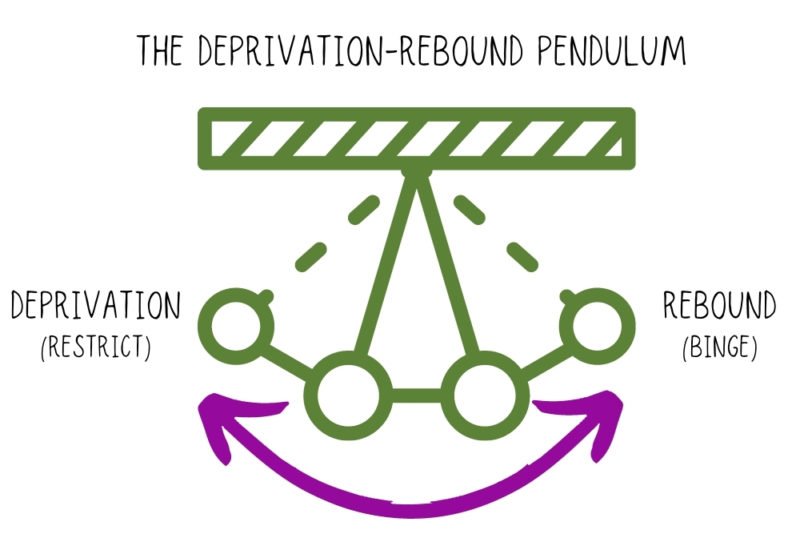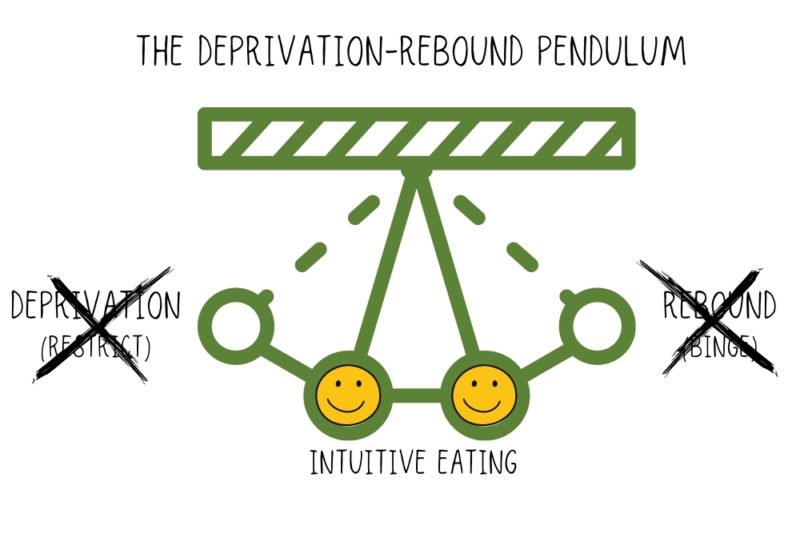
How have the holidays been treating you so far, foodwise? Are you feeling peaceful about food, or conflicted and chaotic with a side of guilt? If you are in a pattern of yo-yo dieting (whether you’re “on” a diet or “off” a diet at the beginning of the holiday season), whether you’re limiting calories or avoiding foods you’ve decided are “bad,” that potentially sets you up for a lot of chaos and guilt when faced with foods that don’t fit how you think you “should” eat.
Similarly, if the holidays are a challenging time for you — maybe you feel the pressure to be happy and merry when you are decidedly not — you might find yourself turning to food for comfort, perhaps with a vengeance, especially if you don’t have a well-rounded set of coping strategies.
No matter what the underlying reason, if you feel like your eating is out of control over the holidays, this is going to affect how you feel both physically and emotionally, and it sets you up for trying to reclaim control come January 1, most likely in ways that just perpetuate a vicious cycle. Or maybe you aren’t waiting for January 1…maybe you’re trying to “manage” your eating now, only your attempts at control have you swinging back and forth in a holiday eating pendulum.

The deprivation-rebound pendulum
I know you know what a pendulum looks like, but I made this little graphic just in case. Visualize the pendulum swinging waaaaaay to the left. That’s what happens when you deprive yourself of food, whether you’re simply not eating enough (calorie restriction), avoiding carbs (macronutrient restriction), or not allowing yourself to eat foods that you’ve labeled as “bad” or “unhealthy” even if you love them and they’re only around during the holidays (forbidden food syndrome).
Regardless of what you’re restricting, at some point, your “willpower” will snap like an overstretched rubber band. Maybe you’re extra stressed. Maybe you’re extra hungry and the idea of politely eating a “healthy” meal flies right out the window. Maybe your neighbor gives you a plate of beautiful Christmas cookies and, darn it, you said you weren’t going to eat cookies, but you can’t be rude to your neighbor so maybe you’ll try just one…and then the whole plateful is gone.
And then the pendulum swings back all the way to the right. The deprivation of restriction has triggered a rebound effect, which in some cases includes full-on binging. And hey, since the cat’s out of the bag, horse has left the barn, and what ever other metaphor you like, you might as well keep eating this way for the rest of the day…or until Monday, when you can start over again. In for a penny, in for a pound, right? This is classic Last Supper eating. You may have slipped this time, but it will never happen again, so you might as well eat all you can right now.
Food for thought
The Last Supper mindset is challenging to shift out of, but here are a few things to think about to get started:
- No single meal, day of eating or week or month of eating makes or breaks your health and nutritional status. It’s how we eat over time that matters. (Not to mention that many, many factors affect our health, and food is only one of them.) So if you feel like you’re out of control, or simply that you didn’t make what feel like the best choices, the next time you eat is a fresh opportunity to choose foods — and amounts of food — that satisfy you and leave you feeling good.
- No matter how much you ate yesterday, or at the previous meal, when you feel hunger again, you need to eat. It drives me bananas when I see advice like, “Eat too much at Christmas dinner? Skip breakfast the next day.” The fact is that no matter how much you eat, you will get hungry again. And if you ignore that hunger, you’re setting yourself up for what feels like chaotic, out-of-control eating — as in the deprivation-rebound pendulum.
- When you sit down to eat, whether it’s a meal or a snack or some holiday cookies, check in with your hunger. If you’re not hungry but you’re reaching for food, ask yourself what you want that food to do for you. If the answer is, “I want the pleasure of these holiday cookies,” that’s legit. Enjoy the cookies mindfully, and watch for the point where the pleasure starts to dim. Like, the cookies still taste good, but not AS good. That’s a great time to stop. If you are hungry, ask yourself if what you’re about to eat is the best choice for satisfying that hunger (for example, a nourishing meal or snack may be a better choice than holiday cookies). Then ask yourself how you want to feel when you are done eating. Comfortably full? Uncomfortably full? If it’s the former, aim to stop eating at the right point to achieve that goal (which means being mindful). If you answered “uncomfortably full,” then be curious about what’s going on. Are you trying to distract yourself from feeling uncomfortable emotions by eating to the point of physical discomfort?

Aiming for true satisfaction
Food is our fuel, but it’s also a source of pleasure. Maximizing enjoyment is a better motivator than any “should,” and that maximizing enjoyment includes choosing foods that taste good and feel good to the body.
Part of pleasure, satisfaction and enjoyment stems from being hungry — because it helps food tastes better — but not too hungry. Honoring hunger is a core principle of intuitive eating, and staying nourished throughout the day is essential. If you have primal hunger when you approach a holiday meal or have holiday treats in the house, when you eat those special foods you are not going to fully enjoy them. That’s for physiological, neurological, and biochemical reasons.
Some people also make the mistake of trying to compensate for special holiday treats by skipping lunch or dinner, only to become overly hungry. When you combine being too hungry with delicious holiday food, it makes it more likely that you will overeat.
Permission to eat foods you enjoy and tuning into to physical and emotional sensations during and after eating are two intuitive eating principles that go hand in hand. Instead of trying to follow predetermined diet rules, eat with intention and attention — in other words, with purpose and awareness. Set your intention to feel better when you’re done than you did when you started, then eat with attention to your food and your body. Is the food tasting as good as it looked, or as good as it was when you started eating it. There’s a saying that fits well here: “If you don’t love it, don’t eat it. If you love it, savor it.”

Hovering around the middle
Intuitive eaters may indulge a bit when holiday favorites are on offer, but this degree of indulgence is a far cry from the deprivation rebound pendulum. It’s a gentle swing that hovers around the midway point. An intuitive eater might fully enjoy a holiday meal that’s richer than their usual day-to-day fare, but they’re likely to balance that out with some lighter meals, not because they “should,” but because our bodies desire balance, and intuitive eaters are attuned to what their bodies are telling them.
Dipping your toes into Intuitive Eating can feel challenging during the holidays, but it can be done. And if your eating is causing you distress, then the sooner you start working towards a more peaceful relationship with food, the better. I’ve had clients begin learning Intuitive Eating during challenging times (including many since the pandemic started), and they often find the benefits spill over into other areas of their life, helping them cope with stressors better. The truth is, there’s never a “perfect” time to make changes that benefit our well-being. So why wait? Give yourself the gift of the newest edition of the book that started it all, “Intuitive Eating.” Happy reading!
This post contains Amazon Affiliate links. As an Amazon Associate I earn from qualifying purchases.
Disclaimer: All information provided here is of a general nature and is furnished only for educational purposes. This information is not to be taken as medical or other health advice pertaining to an individual’s specific health or medical condition. You agree that the use of this information is at your own risk.
Hi, I’m Carrie Dennett, MPH, RDN, a weight-inclusive registered dietitian, nutrition therapist and body image counselor. I offer compassionate, individualized care for adults of all ages, shapes, sizes and genders who want to break free from eating disorders, disordered eating or chronic dieting. If you need to learn how to manage IBS symptoms with food, or improve your nutrition and lifestyle habits to help manage a current health concern or simply support your overall health and well-being, I help people with that, too.
Need 1-on-1 help for your nutrition, eating, or body image concerns? Schedule a free 20-minute Discovery Call to talk about how I can help you and explore if we’re a good fit! I’m in-network with Regence BCBS, FirstChoice Health and Providence Health Plan, and can bill Blue Cross and/or Blue Shield insurances in many states. If I don’t take your insurance, I can help you seek reimbursement on your own. To learn more, explore my insurance and services areas page.






